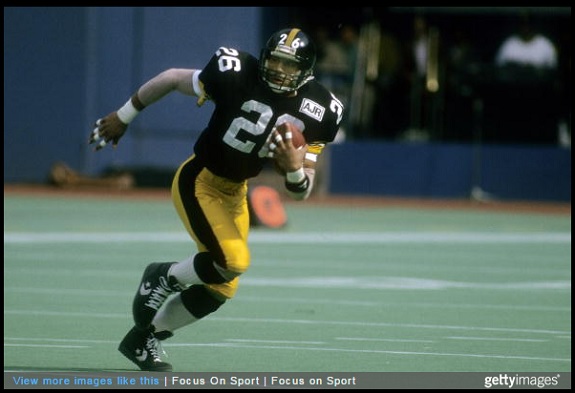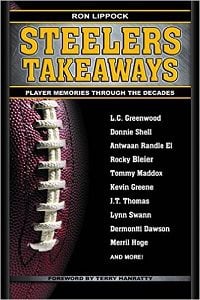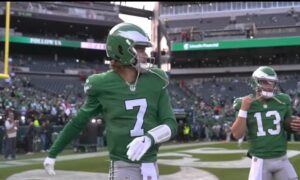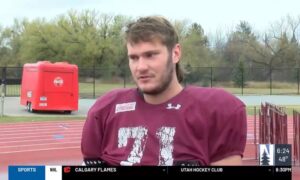Bringing you another Pittsburgh Steelers’ interview courtesy of our good friend Ron Lippock of the Pittsburgh Sports Daily Bulletin. Today, Ron interviews Hall of Famer Rod Woodson, who needs no introduction from us. They talk about his coaching career, learning from Donnie Shell, and why he left Pittsburgh.
Be sure to check out Ron’s book, Steelers’ Takeaways: Player Memories Through The Decades, featuring over 400 interviews with players and coaches, past and present. You can buy it on Amazon through the link provided here.
First, can you let us know us know what you’re next steps are in your coaching/post-NFL career?
I left a really good job at the NFL Network as an analyst to give something back to young players as a coach. These milliennials players are a different kind of player and have a different kind of need. I’ve coached for five or more years now and I am trying to get deeper into giving back to others what was given to me.
Who helped you define your coaching style – and how would you describe how you are as a coach?
When I got to the league I had some really good coaches . Cowher, Dungy, I played under a young John Fox… And Rod Rust put me over the top. LeBeau, Cowher…they inundated me with information on how to be a better person. The idea was that if a player betters themselves as a person that betters their play on the field too. Now as a coach, when I first meet with my players, I take the first five minutes just to talk about life. I talk to them about the fact that if you’re immature as a person, you’ll be immature as a player too. That’s why I got into coaching.
I’d love to stay in coaching, but it’s not my call. Football drives you….I just have to bide my time. It’s a grind, but not like being a factory worker. You just have to have the contacts to find a job. It’s not a great process.
As a head coach, you have to be a manager and teach responsibility to your staff and players. A head coach is a manager. I think every head coach should take a manger class. They have to manage and engage their employees and players. That’s part of their role – to get players and coaches to achieve uncommon deeds.
Stepping back some – let’s start with when you were drafted. Were you surprised to be drafted by the Steelers?
I never talked to Pittsburgh – I had no conversations with them at all throughout the process. I did talk to the Chargers and New Orleans, who I think would have taken me right after Pittsburgh.
I knew that if I was there at Pittsburgh’s pick they would take me. Stouffer and Junken were taken before me – earlier than most people thought they would be. I was blessed to end up going to one of the best sports organizations in all of sports. When they called me, they asked if I would mind being a Steeler. I was like, really? Definitely! It was one of my best memories, sitting at home in Indiana with my family together when I got that call.
How hard was it then dealing with the holdout – and what was behind that?
There was no slotting back then for paying draft picks. You could pay whatever you wanted, and once they had your rights they had them forever. There was Plan B free agency then, but there was only one player that ever moved via Plan B.
I had no money in my pocket then, but I was having a great time running track. The players in front and behind me got a certain amount each, and I just wanted to get paid in that category. We struggled and went back and forth. But like I said I never had any money anyway, so I could just stay in Fort Wayne, Indiana and have fun running track.
My lifelong dream was to play in the NFL. But I didn’t want to sell myself short. It was kind of a Woodson family trait. The men are hard-headed. That could be a detriment, but we had strong fundamentals and stood up for what we believed in and stuck to them. I had a standard for what I thought I was worth. For the longest time we couldn’t get it done, but we finally did and I played the last five or six games of the season.
I just remember coming in once I signed and looking at Chuck Noll and realizing how lucky I was to be coached by him.
Who helped mentor you on as a rookie – both on the field and off?
My roommate as a rookie was Donnie Shell. That was great for me. We’d go to the hotel before games and go over the gameplan. His biggest advice was about being a pro both on and off the field.
Noll always told us that we have to be ready to get on with our life’s work. I was a twenty-one year-old. I didn’t understand that most guys are done at thirty-three or thirty-four. It was rare – I was done at thirty-seven. But even then, what was I going to do afterwards, for the rest of my life? He and Donnie helped me to become a better man outside of the NFL. That maturity would then find its way back on the field.
That is the essence of football. The best guys are usually the most mature ones. Noll told us all the players in the NFL are talented. Talent doesn’t mean anything. You have to take the mental and physical and apply that to practice and games. That’s how you become great and separate yourself from other players.
You mentioned before that Rod Rust put you over the top?
Rod Rust came in later – he challenged me to be a better player mentally. We didn’t have indoor facilities. So when it was frigid weather we did walk-throughs in the locker room. One day me and the defensive backs were talking to each other and he stopped the walk-through and cussed me up and down. Rightfully so. He said I was talented but didn’t understand the game. He challenged me to meet with him during the offseason to learn how to better read offenses and how they disguised plays. I said yes – definitely. About two months in the green light went on. I was mentally more in tune with what offenses were doing and thought, wow, this makes it much easier for me.
At some point you went from being mentored to being that vet that mentors others. How did that work for you – was that difficult?
We were a young team when I got there. We had three defensive backs in my draft class – me, Everett and Hall. Larry Griffin and Curt Gowdy were there and were young guys too. We took our lumps together.
We later drafted guys on the back end – Willie Williams, Figures…I was there eight-to-ten years by then and they had to conform to the Steelers way. Number one picks had to conform to become successful, and they did to. That’s what I said to them. I told them they had to be on time. No, to be early. Being on time means you’re late. You make people wait for you while you get yourself ready and that’s selfish. That’s how I liked to give back to the players.
The biggest impact when I left the and played for the Ravens was with a young Ray Lewis. He was talented but didn’t know how to be a professional. He didn’t know what to do. I told him he needed to speak up. And to take care of his body. To be that voice in the locker room. He listened and became a great mentor and the voice for the Ravens.
And as a Steelers fan, Rod, we all say thanks so much for helping him become so good and playing for a rival!
Ha – well, I didn’t want to depart. It was a sad situation. The biggest thing was, I wanted to retire as a Steeler. My tenth year, I told Bill I wanted to be a safety. I wasn’t a natural corner. I played safety all through high school and college. I didn’t like playing cornerback. I played with my eyes, and that can get you in trouble looking back at the quarterback as a cornerback.
So I told Bill I wanted to be a safety and they offered me three years. I wanted five. I told him I know there are no guarantees but I wanted the chance to retire as a Steeler. The day of the draft I got a call and the Steelers asked if I was going to take the offer. I was offended. After ten years they were making me answer in thirty seconds. I hung up on them and that was the last time I talked to them for a long time. I was upset at them then. All is forgiven now. They forgave me and I forgave them. Since then I’ve done an internship with them and still know lots of people there.
So, let’s talk about moving on to Baltimore. After all the fan anger of Harrison gong to New England, can you talk about playing for rivals and if players look at it the same way fans do?
It was great to get a ring with the Ravens. I wanted to be the best and unfortunately I didn’t get one with the Steelers. We came close and lost the Super Bowl. These things haunt me a bit. Once you don the Black & Gold you are a Steeler for life. I wore black & gold in high school and college then with the Steelers. It was unfortunate I couldn’t be a Steeler my whole career.
To me, being upset at playing for rivals is a fan thing. I went to the 49ers first for a year, chasing a ring. Then Marvin Lewis called me and asked me to come to Baltimore. That they were developing a good young team. They were 6-10 that first year, they weren’t a good team at first.
The Steelers and Ravens were very similar in many different ways. The ownership and leadership from the top trickles down to the field. Both had great owners and great GMs and that trickles down to the players. They are very similar. The physicality and run game focus – they have similar styles. But yeah, I think the fans are much more concerned about that than the players.
So give us a good, fun story about your time in Pittsburgh!
Well, when I got to Pittsburgh I stayed in an apartment on the North Side, Friday practices were half-days and Saturdays we started early – we’d meet at eight.
Joe Greene was our defensive line coach. I heard about him. We’d see clips of him and hear about his iconic personality. We’d be in meetings and would hear him throwing things around in other rooms in anger.
So one Friday I went out with the guys Friday night and didn’t get up for practice. I just got a puppy and he got out of his cage – this was before cell phones. he chewed through the landline and my alarm clock. So. I didn’t get up for practice. Around 10:30 I hear a boom! boom! at the door. I jumped up startled and ran to the door. It was Joe Greene. He looked at me and told me “You better never be late again!” That was the only time I was late. He was so intimidating – on and off the field. That was my “A ha” moment as a young player about Joe Greene!
So, lastly, tell us how you feel about the way the game has changed for cornerbacks. How can you be successful with these new rules?
The rules have changed and the way refs throw flags…it changes depending on the ref. You can’t have flags tough dictate how you play. You have to be smart and know you have a smaller target zone. But the basic skills – playing top down, knowing you can be a little grabby if the refs let you…. But you have to use the fundamentals and techniques. If you do so you can win as a cornerback. Especially if you have the front to get to the quarterback. I would have had a lot more penalties probably if I played now, but I have coached it now. It can be done.
My dream job is to come back to the Black & Gold and coach those guys. They have Carnell, who started with the Steelers in 2011, the same time I started with the Raiders. We didn’t end up being as good as Pittsburgh was. I know they have Carnell and he’s done a great job and don’t want to replace him, but I would love to don those colors one more time somehow. Once a Steeler, you’re always a Steeler.









